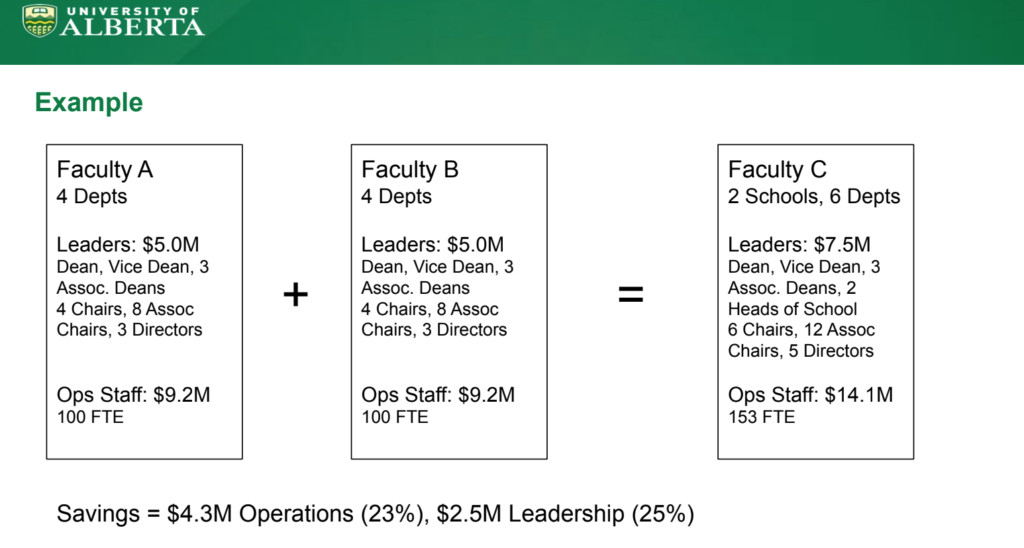SU councillors press U of A about academic restructuring proposal
A number of concerns about the U of A's academic restructuring and service excellence transformation proposal were voiced during Students' Council
 Helen Zhang
Helen ZhangStudents’ Council grilled the University of Alberta’s academic restructuring working group for answers about impacts changes will have on students.
The U of A is considering undertaking organizational and academic restructuring in order to realize over $120 million in savings through streamlining senior administration, cutting administrative positions, and evaluating efficiency of program delivery. This could include a reduction of faculties, having faculty members in administrative positions return to full-time teaching and research, increasing undergraduate and graduate enrolment, and cutting under-utilized programming.
Steven Dew, the U of A’s provost and vice-president (academic), gave the presentation to council and answered their questions on behalf of the academic restructuring working group tasked with coming up with proposals for university governance to consider. The presentation and ensuing discussion lasted for over an hour at Students’ Council meeting on August 25, 2020.
Councillors pressed Dew to provide answers as to how academic restructuring would affect the student experience at the U of A, Campus Saint-Jean, diversity, and student representation at university governance bodies.
Academic restructuring working group will have proposals for GFC and BoG to consider by September
Dew began the presentation by reiterating that the U of A “will have to change significantly” in order to remain competitive and proactively respond to fiscal challenges as opposed to simply making cuts every time government funding levels change.
“U of A for Tomorrow is about using this as a moment in time to do a pivot to reshape the university in a once in a generation way… to rethink what the U of A is about,” he said.
“We have to move from our back foot of trying to struggle to maintain in the face of budget cuts, to rather instead be forward looking — bold with a new vision of where the university should be going.”
Dew added that restructuring a university is normally a process that takes years, yet the U of A is undertaking it in under a year because of the fiscal reality following two successive provincial budgets full of cuts to post-secondary institutions.
“The size of cost-reduction is unprecedented in the history of the U of A, and the speed at which we must respond is unlike any faced by another institution.”
Dew provided a rough timeline stating that restructuring options will be presented by the working group to the U of A’s General Faculties Council and the Board of Governors in September with final approval happening in January 2021.
The presentation explained U of A for Tomorrow will include elements of academic restructuring — changing the composition of faculties and departments to create economies of scale to streamline university administration — and “service excellence transformation” (SET). SET will standardize work processes between faculties for greater synchronization between units, reduce bureaucracy, and improve overall service quality for students attending the U of A. Dew painted an example of how these two elements will help the U of A move forward.
In his example, two faculties would be amalgamated into one in order to preserve their academic and research missions but achieve cost savings through reducing upper administrative positions and not duplicating operations staff.

“There would be a consolidation of departments so that the net result of four and four departments would be six,” Dew said. “We see about a 25 per cent reduction in both the cost of leaders who support the academic unit and the operations staff.”
Currently the U of A has 18 faculties, 66 departments, and 82 institutes which are all different in size and composition. The faculty of medicine and dentistry holds the most departments with 21 departments, while arts has 15, and native studies has none. Dew said these variations are “untenable” moving forward.
“Change will be hard. We are an organization with deep roots and traditions. In many cases our academic units are over 100 years old. Suggesting we might do something different is hard. A lot of identity and prestige is wrapped up in the structures that we currently have.”
“Many would see if faculty A disappeared out of the name of the unit perhaps the activity of faculty A doesn’t matter anymore or has been demoted,” Dew said. “That is by no means the message we want to send… This is about keeping our university intact overall.”
Restructuring’s effect on Campus Saint-Jean “concerns” several councillors
Four councillors raised concerns over how academic restructuring would potentially impact Campus Saint-Jean — the French campus of the U of A and lone French-only post-secondary institution in Western Canada.
The organization representing Francophone interests in Alberta and Campus Saint-Jean, the Association canadienne-française de l’Alberta (ACFA), declared it would pursue legal action against the University of Alberta and provincial government on August 17 as it feels the two institutions are not meeting financial obligations to support Campus Saint-Jean.
In May, the ACFA launched a political action campaign in order to highlight the funding shortfall CSJ faced. A 13.3 per cent budget decrease since December 2019 through the province’s Budget 2019 forced the French campus to decrease their course delivery by 44 per cent —translating to the termination of 108 of the 409 courses currently offered by the campus. As of publication time, 77 courses have been discontinued.
A French CBC Radio Canada article revealed an internal email saying the U of A is considering nine academic restructuring scenarios, six of which could lead to the permanent closure of Campus Saint-Jean and the absorption of the French faculty into another academic unit at North Campus.
Eric Einarson, Campus Saint-Jean councillor, asked Dew about the nine scenarios and if Campus Saint-Jean’s elimination was on the table.
Dew said no scenario would completely eliminate Campus Saint-Jean, however, he could not promise that the French campus would not come out of restructuring without impact.
“There is a tremendous value in having an immersive French language experience at the U of A,” Dew said.
“I can’t promise Campus Saint-Jean… will not be impacted with what we are doing. It is going to be transformative for the entire university but I do commit there will be a community that is an immersive education experience for French language students.”
“The goal here is not to change the programming. The Campus Saint-Jean programming would continue in the short and mid-term. In the long term, it will evolve as the university evolves.”
Student representation at GFC to likely decrease after restructuring
Several councillors, including engineering councillor Amlan Bose, inquired about how university governance bodies like General Faculties Council (GFC) will be affected by academic restructuring.
Dew said while he had not done the exact math, through consolidation of faculties, student representation will decrease at General Faculties Council — the highest academic decision-making body at the U of A.
The decrease in seats would depend on how many faculties were consolidated through the restructuring process.
“The membership of GFC is largely dictated by formula and if we were to decrease the number of faculties which drives the formula then GFC would be a smaller body,” Dew said.
“This would also result in a decrease in faculty members, administrators. That whole balance would be maintained, but it would be a smaller group of people.”
Council asks if all student voices are being considered fully in the academic restructuring process
Talia Dixon, arts councillor, questioned how the working group expects to hear the voices of all the diverse undergraduate students at the U of A if only the Students’ Union president represents them.
“Just having [Students’ Union president] Joel Agarwal on this committee is honestly to me not representation of undergraduate students,” Dixon said. “He is one individual.”
Dew said ultimately the decision-making bodies making the calls about what academic restructuring will look like will be General Faculties Council and the Board of Governors which have student representatives.
“Those are bodies that students are represented on and will have an expectation of having consultation done being demonstrated to them,” Dew responded.
He added that the working group will produce a final report summarizing their work and explaining why certain routes were decided upon for full transparency.
“This will show the inputs we have heard from the plethora of stakeholders we’ve engaged,” Dew said.
In a follow-up question to Dew, Dixon asked how the working group would consider feedback from students outside venues like town halls, presentations to Students’ Council, and emails written to him.
“Coming to Students’ Council once is not consultation,” Dixon said. “We are just a few individuals. How is it going to be proven to students that our feedback is being taken in?”
Dew emphasized new tools being used at town halls, like the ThoughtExchange platform, have allowed for the gathering of real-time feedback and engagement in order to help inform the working group.




